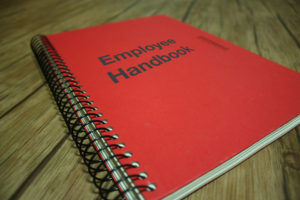May 28, 2019

Finding the right employee for the job is important in any business. It’s also important to craft the right employee handbook.
A well-drafted employee handbook orients the new employee to the company and outlines some of the company’s policies and procedures. On the other hand, a poorly drafted handbook can tie an employer’s hands and result in disputes over a range of issues.
For the best results, follow these guidelines when drawing up an employee handbook:
This is not a contract
A company should include a strong statement in its employee handbook that the handbook is not intended as a contract of employment and does not constitute one. Handbooks should also clearly state that continued employment is at the will of the company. The latter provision generally applies to all non-union employees unless they have an individual employment contract.
Handbooks should also be drafted in such a way that the company retains flexibility and discretion to properly manage and, when necessary, discipline employees. For example, the section covering workplace rules should clearly state that the rules are not a comprehensive list of prohibited conduct, but are only examples of conduct that may result in discipline.
Benefit plans
Employee handbooks often refer to benefits available to employees and their dependents. However, handbooks should not attempt to outline the benefits available under those plans. By mentioning specific benefits in the handbook, the company risks being unclear or even wrong about them, and therefore may expose itself to liability.
Hours and pay
An employee handbook may state the company’s hours of operation, starting and ending times for shifts, break times, and vacation information. When discussing these, however, the handbook should contain a clear and specific statement that the company reserves the right to change them.
Also, if the handbook addresses vacations, it should specify at what point an employee has earned his or her vacation pay. The handbook should also be clear regarding what happens if an employee leaves the company before the end of his or her next earned vacation date.
Drug and alcohol policies
Many companies have set up drug and alcohol policies, which may include pre-employment screening, post-accident testing, and the right to conduct searches. These policies should be included in the handbook and carefully drafted. Having a written policy letting employees know that lockers, cars, lunch boxes, etc., may be searched under appropriate circumstances can deter illicit drug and alcohol use and may also diminish legal problems when it is necessary for the company to conduct a search. Having a written policy in effect makes it harder for an employee to assert a right of privacy to hide drugs or alcohol.
There is no magic formula as to what should or should not be included in an employee handbook. The key is simply to do it right. Use it to welcome employees to your company and outline your general policies, rules, and procedures. A poorly drafted handbook can tie you in legal knots and interfere with the proper management of your company and employees.
Have a question about this or a similar issue for your organization?
[button color=”orange” link=”https://warrickandboyn.com/contact/”]Contact Us[/button]
Warrick & Boyn, LLP, is a full-service law firm in Elkhart, Ind., that practices in all areas of business and corporate law. Areas of practice include commercial litigation, creditors’ rights and bankruptcy law, labor and employment law, defense litigation, securities law and regulation, worker’s compensation defense, education and school law, EEOC law, employee benefits law and pension plans, environmental law and regulation, tax and estate planning, municipal law, and property and real estate law. The firm’s clients are located primarily in northern Indiana and southwestern Michigan, and most of the attorneys are licensed to practice in both Indiana and Michigan.
